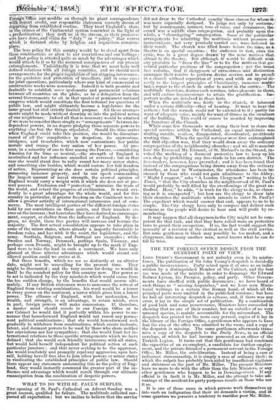• WHAT TO DO WITH ST. PAUL'S SURPLUS. THE opening
of St. Paul's Cathedral on Advent Sunday was a , great success, qualified by failure. The multitude collected sur- pasSed all expectation ; but we incline to believe that the service
I did not draw to the C'athedial exaCtlf those classeifforAwhenitilq was more especially designed. To fudge not only'. by toostnme;V ; but by countenance, manner, tone of voice, and dernealieur; theI crowd was a middle class congreg,ation, and probablv upon. theJ whole, a "churchgoing" congregation. Some of Abe...particular!: arrangements for admitting the multitude without 'premium ink inconvenience, not very precisely carried Out, were defeated int their result. The church was filled hours before the time, as'*; i theatre is on special occasions ; the audience in fad, cries be cynic, was in a great degree' dravvi'0 by the same motives thM I attract to the theatre. But although It1 would be difiloalt with; any precision to "draw the !hid!'"Ortoifix the' inetives.that go4, verned particular positions of the congregation ; yet the lardi fact remains, that if clergymen of earnestness and -41istinetion announce their resolve to perform divine service, and ,ta fieaoli in a church without separation of pews, and with au lippeolidit.! reetly to the largest principles of Christianity, immense, " tides repair to the church in order tO asisist in the ser4iee.11 /IP,
milltitude therefore; desires such services, takes pleasurie in theist,: and will endure inconvenience to attain the gratification. Ims1 portant truths are involved in the facts. :if When the multitude was fairly in the church; it labouni& under a serious difficulty—that of hearing. It went to hear Ithh sermon ; but the sermon could not be {extended to it partlyier want of adequate voice, mainly for want of fitn4iss in the.strimlants of the building. This could of course be mended by improving the furniture of the Church.
While some few thousands were doing their best to share the special services within the Cathedral, an 'equal multitude was waiting out side, restless disappointed, discontented; protitlessly wasting time: When the special serviceewbre first contemplated the firit objection was, that they would draw away the ordinary congregations of the neighbouring churches; and we allliemember how the Reverend Mr. Edenart, of St: Michael's in the Strand, ine yoked the working of a dormant protective law to keep up his own shop by prohibiting' any free-trade in his own district. The free-traders, however, have prevailed ; and it has been found that instead of the congregations being drawn away from the ordinary churches, at least in Westminster, the attendance has been =- creased by those who could not gain admittance to the Abbey. "Might I suggest," asks "A London Clergyman." writing to the Times, "that the City churches in the neighbourocd of St. Paul's would probably be well filled by the overflowing& of the great ca- thedral. Here," he adds, "is work for the clergy to do, as cheer- ing as it is unexpected "; but how are the clergy to draw into their churches the multitude which intends to enter St. Paul's? The expedient which would answer that end, appears to us to be simple. The City clergy have only to compose and deliver such sermons as the people will desire to hear and will profit by re- membering.
It may happen that all clergymen inthe City might not be com- petent for that task, and that they have relied more on protective laws to guard their occupation. If so, the fact would suggest the necessity of a revision of the clerical as well as the civil service. But some gentlemen in black may possibly be too modest, and a clergyman, like many another man, never knows what he can do till he tries.


































 Previous page
Previous page